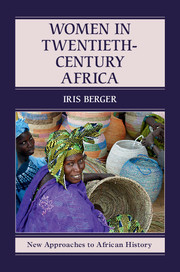Book contents
- Frontmatter
- Dedication
- Contents
- LIST OF ILLUSTRATIONS
- LIST OF MAPS
- PREFACE
- Map
- Introduction
- 1 Colonizing African families
- 2 Confrontation and adaptation
- 3 Domesticity and modernization
- 4 Mothers of nationalism
- 5 The struggle continues
- 6 “Messengers of a new design”: marriage, family, and sexuality
- 7 Women's rights: the second decolonization?
- 8 Empowerment and inequality in a new global age
- Contradictions and challenges
- REFERENCES AND FURTHER READING
- INDEX
2 - Confrontation and adaptation
Published online by Cambridge University Press: 05 May 2016
- Frontmatter
- Dedication
- Contents
- LIST OF ILLUSTRATIONS
- LIST OF MAPS
- PREFACE
- Map
- Introduction
- 1 Colonizing African families
- 2 Confrontation and adaptation
- 3 Domesticity and modernization
- 4 Mothers of nationalism
- 5 The struggle continues
- 6 “Messengers of a new design”: marriage, family, and sexuality
- 7 Women's rights: the second decolonization?
- 8 Empowerment and inequality in a new global age
- Contradictions and challenges
- REFERENCES AND FURTHER READING
- INDEX
Summary
In 1938, a District Commissioner in the Kigezi district of southwestern Uganda wrote with alarm about a Christian revival movement that was sweeping his area. He reported, “The result has been particularly disturbing to the women, who have refused in some cases to cultivate at all, and have forsworn beer, tobacco, and beads, and made a habit of night services.” This flourishing religious movement, whose adherents called themselves balokole, the saved people, responded particularly to women's tensions over family life and sexuality. Through new “families” created among communities of converts, these women found refuge from the pressures of more “traditional” non-Christian relatives and support in confronting life crises such as infertility and unwanted marriages.
In addition to personal support, the movement offered women new and egalitarian social and religious roles, allowing them to take part in preaching teams and personal evangelical activities, which provided an avenue for becoming literate and for gaining equality with men in the community. As in many African churches, signs of conversion included charismatic experiences such as having visions, hearing voices, entering trance states, and experiencing uncontrolled shaking. The context for this religious innovation was both the new colonial regime and the declining power in the late nineteenth century of older spirits that addressed women's life crises. The revival not only filled this spiritual vacuum, but created an entirely new alternative community that promised women equality and responded to their spiritual and practical concerns.
In the context of colonial transformations that displaced them economically, undermined their political authority, disrupted families, and threatened the life and well-being of their communities, women at times adapted to the new order, which they sought to shape to their own ends. But they also turned to more public and collective movements, both religious and political, in response to the social and political crises they were experiencing. Unlike European colonial officials and missionaries, who blamed African women and “traditional” practices for steep population decline, women sought to enhance their spiritual power in new ways to protest against colonial policies that endangered their tenuous control over their lives and families. They also took advantage of the new colonial order to test the boundaries of local and colonial authorities and to use clothing and fashion to adopt new individual and cultural identities.
- Type
- Chapter
- Information
- Women in Twentieth-Century Africa , pp. 30 - 44Publisher: Cambridge University PressPrint publication year: 2016

